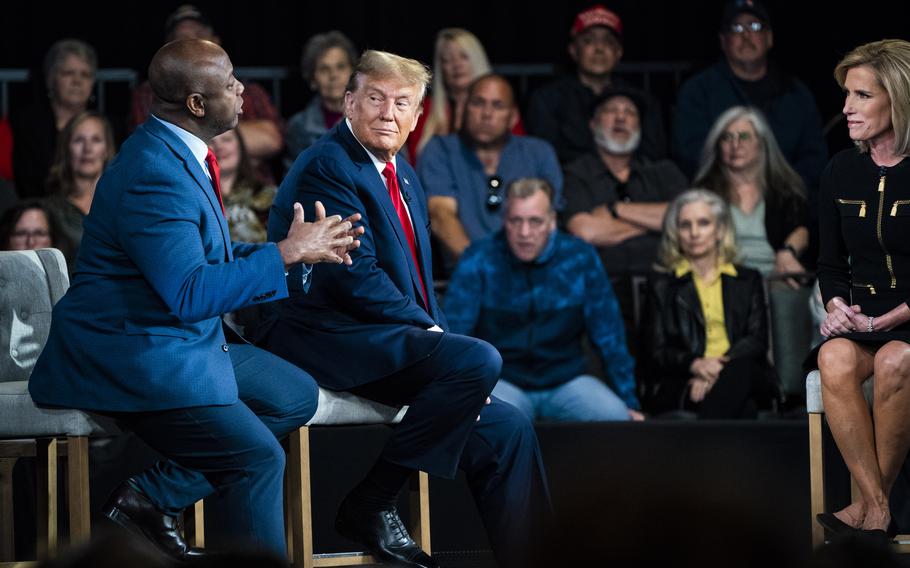
Former president Donald Trump speaks with Sen. Tim Scott (R-S.C.) and moderator Laura Ingraham during a Fox News town hall in Greenville, S.C., on Tuesday, Feb. 20, 2024. (Jabin Botsford/The Washington Post)
NEW YORK — New York Supreme Court Justice Arthur Engoron on Thursday signed a more than $350 million judgment against Donald Trump for a decade-long civil fraud scheme in which lenders and insurance companies were deceived by the ex-president and his company.
The judgment formalizes Engoron’s 92-page decision and order issued last week that includes the financial penalty, plus interest, and non-monetary restrictions that will overhaul the Trump Organization’s leadership structure and will take control away from Trump and his adult sons.
Engoron, in an email exchange posted to the court docket, denied requests by Trump’s attorneys to allow time to argue for changes to the document as proposed by the New York attorney general. The docket was updated Thursday afternoon to show Engoron had signed the judgment.
Engoron found that Trump’s side offered no basis to delay the process.
“You have again asked for time to file a proposed counter-judgment again without explaining in what way the Attorney General’s proposed judgment is incorrect … and again without specifying how your proposed judgment would differ,” Engoron wrote to Trump attorney Clifford S. Robert.
Trump’s attorneys Wednesday requested a month-long delay in enforcement of the civil fraud judgment of more than $350 million against the former president, saying they had concerns with a proposal drafted by the state attorney general’s office.
In a flurry of filings, Robert argued that lawyers for the office of New York Attorney General Letitia James should have consulted with the defense on the drafting of the proposed judgment.
Robert asked for Engoron, who issued the judgment, to give the defense a chance to file a proposed counter-judgment. Engoron, in an email exchange with Robert, indicated there was “no need for a motion or conference on this” because the judgment the attorney general proposed mirrored the terms of his order.
The judge, however, invited Trump’s side to provide specific disagreements with the proposed document by 5 p.m. Wednesday. Trump’s lawyers cited two items they said were incorrect — one of which was adjusted after the attorney general acknowledged an error — and requested more time to evaluate the document and propose any other changes due to what they considered inaccuracies.
In addition to ruling Thursday that no delay was justified, Engoron denied staying the enforcement of the judgment for 30 days, one of Robert’s requests.
Engoron’s endorsement of the judgment gives Trump a month to file a notice of appeal. Trump is expected to appeal and post bond as part of the process.
A draft of the judgment filed by James’s trial attorneys on Tuesday has language that matches Engoron’s bench trial verdict decision. James’s proposed judgment also cites a statutory interest rate of 9 percent per year, which the attorney general has said adds about $100 million in prejudgment interest to Trump’s tab.
Robert argued that the attorney general rushed the process and that Trump’s side should have been included in discussions about it. He requested that, in the event that Engoron signed James’s proposed order, no action be taken for 30 days.
It was not immediately clear whether the 30 days he requested would have extended the time Trump will have by law to post a bond, staying enforcement of the judgment, as he pursues his appeal.
Engoron’s ruling means Trump must cover the judgment by using a significant portion of his wealth, much of which is locked up in real estate and other investments. The judge also barred Trump and two of his sons from serving as officers or directors in any New York corporation. Trump is banned for three years while Eric Trump and Donald Trump Jr. are prohibited from such roles for two years.
Trump and his lawyers have called the case an act of political motivation brought by James, a Democrat, who was critical of Trump and discussed investigating him when she ran for office.
Engoron found Trump, his company and several company executives liable for defrauding banks and insurance companies by deliberately misrepresenting Trump’s net worth in annual financial statements that accountants compiled for them using false asset values.
As part of his ruling, Engoron determined that illegal acts were committed. James argued that Trump and his executives inflated his net worth by up to $2.2 billion every year from 2011 to 2021. With Trump as the sole owner of the Trump Organization, banks and other business partners relied on those statements, the judge found.
Trump’s attorneys argued at the 10-week trial that began Oct. 2 that Trump did not mislead business partners but that commercial real state valuations are subjective and can vary greatly from appraisal figures. Trump’s properties had enhanced value due to his fame and stature, the attorneys said.